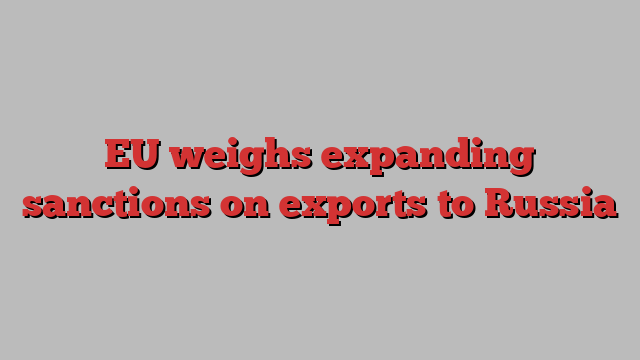
Stay informed with free updates
Simply sign up to the EU trade myFT Digest — delivered directly to your inbox.
The EU is considering extending its sanctions regime against Russia to include the foreign subsidiaries of European companies in order to restrict the flow of sensitive goods reaching the country’s war machine, a senior official has said.
“A lot of the product going through China [to Russia] is coming from subsidiaries of western companies in south-east Asia,” EU sanctions envoy David O’Sullivan said at an event in Brussels on Wednesday. “We are focusing our efforts more on trying to stop the transshipment from there through to China.”
Since Russia’s full-scale invasion of Ukraine, the EU has imposed 14 packages of sanctions against Moscow. These include export controls to stop Moscow procuring goods crucial to its war effort. The EU has also banned re-exports of certain sensitive goods via third countries.
But discussions on further rounds of sanctions, which have to be agreed unanimously by all 27 member states of the EU, have become increasingly fraught as countries find fewer areas on which they can agree without damaging their own economies.
O’Sullivan said that an extension of the re-export controls to subsidiaries of European companies was discussed at a meeting between business and European commissioners Valdis Dombrovskis and Mairead McGuinness last week.
“One of the ideas we had was to extend the no resale to Russia clause . . . which we now wanted to extend to subsidiaries,” O’Sullivan said.
He added that “there was some resistance” from the companies to the idea, and that it was a “difficult conversation” as it would impact production in third countries that have not aligned themselves with the EU sanctions regime.
Discussions on such an extension are likely to be controversial among EU countries as it would cause significant burdens for the businesses concerned.
O’Sullivan said the European Commission was conducting an impact assessment of how such a step would work. “We may find ways forward in a future package,” he said.
Two EU diplomats said that previous proposals to extend bans of re-exports to Russia had not been popular. “The assessment might be a good basis for a new try,” one diplomat said.
Olena Bilousova, a sanctions expert at the Kyiv School of Economics Institute, said that electronics manufacturers often outsource their production, increasing the risk of their products ending up in Russia, which operates a vast network of intermediaries around the world.
“Stronger regulations for subsidiaries are crucial, but should also be paired with monitoring and holding companies to account for negligence,” Bilousova said.
While such measures would extend EU sanctions, they would still fall short of the US system. The American authorities regard any product — even those made abroad by foreign companies — as potentially subject to their regulations if the items are produced using US technology or equipment.
O’Sullivan also highlighted the EU’s efforts to track the financial flows allowing goods shipments to Russia via third countries. “It is a question of identifying which are the financial institutions which are potentially funding the transshipment of battlefield products,” he said.
In the latest sanctions package adopted in July, the EU gave itself powers to target financial institutions outside its territory that facilitate trade with Russia, emulating a similar measure implemented by the US “to great effect”, according to O’Sullivan.
“The US threatened one bank in China, one bank in Turkey and one bank in the UAE. And the mere threat of imposing the sanctions was sufficient for these financial institutions to stop all business,” O’Sullivan said.
Trade data analysed by the FT shows that exports from China and Turkey to Russia of the most critical war related goods fell dramatically following the US decision in December.
The EU has not yet listed any financial institutions but would be prepared to do so. “We are also indicating to countries that if ever we are unable to deal with the issue in other ways, we could have [to] resort to this,” O’Sullivan said.
O’Sullivan added that the EU and its G7 partners were due to meet next week to discuss the financial sanctions and “compare notes”.